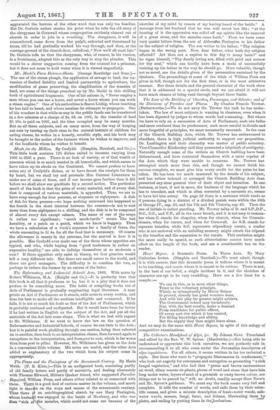The Penns and the Peningtons of the Seventeenth Century. By
Maria Webb. (F. B. Kitto.)—This is an undigested book, consisting partly of old family letters and partly of narrative, and dealing alternately with Thomas Ellwood, Milton's Quaker friend, who suggested Paradise Regai4e4 William Penn, and others either related to or connected with them. Am, is a good deal of curious matter in the volume, and much
light is thro on the ways and means of the seventeenth century. an autobiographical sketch by one Mary Penington, d was engaged in the battle of Newbury, and who was the measles, which could not come out because of the Thus there ' whose husba then "sick M
exercise of my mind by reason of my having heard of the battle." A message from her husband that he was well saved her life ; "at the hearing of it the oppression was rolled off my spirits like the removal of a great stone, and the measles came forth." Then we have some very quaint letters from the son of Aldernfan Penington to his father- on the subject of religion. The son writes to his father, "Thy religion began in the wrong part. Now, dear father, what hath thy religion effected? Art thou not a captive to this day to many lusts?" and he signs himself, "Thy dearly loving son, filled with grief and sorrow- for thy soul," which can hardly have been a mode of successfully training up his father in the way he should go. More valuable, though not so novel, are the details given of the persecution sustained by the Quakers. The proceedings at some of the trials of William Penn are given in full, though not for the first time, or in the most attractive manner. But these details and the general character of the work show that it is addressed to a special circle, and we are afraid it will not have much chance of being read through beyond those limits.






























 Previous page
Previous page